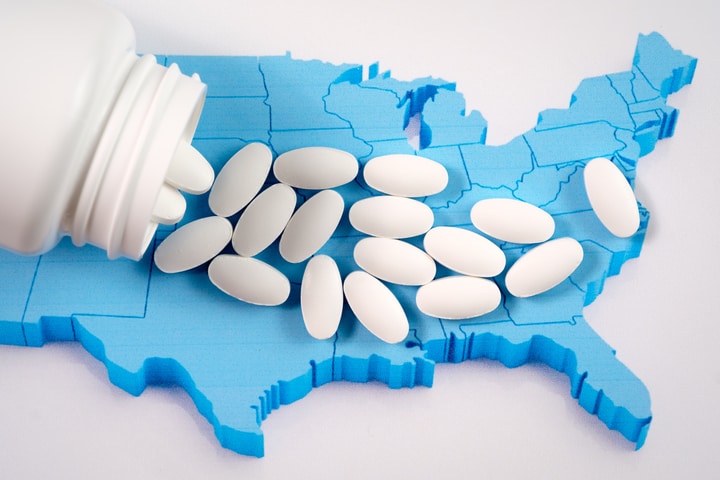
New reporting connected to lawsuits filed by more than 2,000 state, local, and tribal governments seeking to hold drug companies accountable for the opioid crisis in America shows how shipments of opioid painkillers increased across the country as addiction rates accelerated from 2006 to 2012.
According to the Washington Post, over a seven-year period, drug companies distributed 76 billion hydrocodone and oxycodone pills to commercial pharmacies across the country. Pharmacies received 8.4 billion pills in 2006 and 12.6 billion in 2012, a 50% increase.
The U.S. population in 2012 was 314 million. The 12.6 billion opioid pills distributed in 2012 were enough for every person in the country to have 40 of them.
“During the same timeframe, prescription opioids contributed to more than 100,000 deaths in the U.S., according to the U.S. Centers for Disease Control and Prevention,” the Post says.
What is the Opioid Epidemic?
Since the early 2000s, an increase in prescriptions written for opioid pain pills has led to widespread misuse and related overdoses, as well as the rising incidence of newborns experiencing withdrawal syndrome due to opioid use and misuse during pregnancy, the U.S. Department of Health and Human Services says.
Opioid painkillers can be prescribed for moderate to severe pain caused by injury or surgery, or chronic pain from illness, such as cancer. These drugs include hydrocodone, oxycodone, codeine, and morphine.
Federal authorities say pharmaceutical companies reassured the medical community in the 1990s that patients would not become addicted to opioid pain relievers, so healthcare providers began to prescribe them at greater rates. The increase in prescriptions led to widespread misuse both by prescription holders and users who bought opioids illegally before it became clear that these medications could in fact be highly addictive.
From 1999 to 2022, almost 310,000 people died in the United States from overdoses related to prescription opioids, according to the U.S. Centers for Disease Control and Prevention (CDC). Overdose deaths involving prescription opioids were five times higher in 2017 than in 1999.
Lawsuits filed across the country allege that manufacturers knew opioids were highly addictive and that manufacturers and distributors promoted and failed to monitor the increased use of opioids for profit.
Purdue Pharma was fined $635 million in 2007 for falsely claiming its drug, OxyContin, was not as addictive as earlier opioids. However, the Post says its analysis shows that Purdue accounted for just 3% of pills sold from 2006 to 2012 and that three generic drug makers accounted for nearly 90% of the sales.
The Opioid Crisis in South Carolina
Along with its report, The Post has published an interactive version of the DEA database it obtained in its lawsuit. The database allows users to see how much hydrocodone and oxycodone went to individual states and counties, and which companies and distributors were responsible.
It says 1,832,404,451 prescription pain pills were supplied to South Carolina from 2006 to 2012.
The top 5 manufacturers sending opioid pain pills to South Carolina were:
- Par Pharmaceutical —6 million pills
- SpecGx LLC —5 million pills
- Actavis Pharma, Inc. —9 million pills
- Golden State Medical Supply, Inc. —1 million pills
- Aphena Pharma Solutions – Tennessee, LLC —8 million pills.
The top 5 distributors of opioid pain pills in South Carolina were:
- McKesson Corporation —4 million pills
- Cardinal Health —3 million pills
- CVS —8 million pills
- Smith Drug Company —59 million pills
- Walgreen Co. —9 million pills.
The top 5 pharmacies selling opioid pain pills in South Carolina were:
- VA Consolidated Mail Outpatient Pharmacy, North Charleston —4 million pills
- Parker Road Drug Store, Greenville — 9 million pills
- Pharmacy Consultants, Inc., Spartanburg —5 million pills
- Ken’s Thriftee Pharmacy Inc., Walhalla —67 million pills
- South Carolina CVS Pharmacy, L.L.C., Greenville — 5.65 million pills.
The S.C. Department of Health and Environmental Control says in its October 2018 report, Opioid Prescriptions in South Carolina, the number of opioid pills dispensed in South Carolina peaked in 2015 but has been decreasing since. In 2016, 311.3 million opioid pills were dispensed, while in 2017 fewer than 286 million pills were dispensed. The annual number of opioid pills per person declined from 63 to 57 per person in South Carolina.
However, the SC DHEC report shows drug overdose deaths increasing from 2014 to 2017, including fatal overdoses involving opioids rising from 504 in 2014 to 748 in 2017, a 48% increase.
A Closer Look at Evidence in Prescription Opioid Defective Drug Cases
The reporting by The Post illustrates not only the breadth of the opioid crisis but also the kind of information legal teams seek to gather for defective prescription drug lawsuits.
“The data provides statistical insights that help pinpoint the origins and spread of the opioid epidemic — an epidemic that thousands of communities across the country argue was both sparked and inflamed by opioid manufacturers, distributors, and pharmacies,” plaintiffs’ lawyers said in a statement.
The information obtained was U.S. Drug Enforcement Administration data derived from reports that drug distribution companies are required to file with the federal government.
The Washington Post and HD Media sued to obtain the DEA data, which the federal court in Ohio held as part of the evidence submitted in the opioid distribution lawsuits being heard.
The case known as MDL 2804, National Prescription Opiate Litigation will be heard in U.S. District Court for the Northern District of Ohio in Cleveland. An MDL, or multi-district litigation, combines similar cases involving complex issues filed in multiple districts so they may be heard at once. This case’s MDL transfer order combines 64 cases from nine districts in Alabama, California, Illinois, Kentucky, Ohio, Washington, and West Virginia.
In MDL 2804, “Plaintiffs allege that the manufacturers of prescription opioids grossly misrepresented the risks of long-term use of those drugs for persons with chronic pain, and distributors failed to properly monitor suspicious orders of those prescription drugs — all of which contributed to the current opioid epidemic,” the court says.
U.S. District Judge Dan Polster, who will hear the case, ruled that the information covering opioid pill shipments from 2006 to 2012 could be made public.
In 2018, a federal appeals court vacated Polster’s previous decision that local and state governments, granted access to the data, should not make it public. In his ruling this July, Polster said there is “clearly no basis” for shielding older data, though information collected for 2013 and 2014 remains under wraps.
The first scheduled trial before Polster is set for October in lawsuits filed by Ohio’s Summit and Cuyahoga counties, areas that have been hit particularly hard by the ongoing opioid crisis. “It is considered a bellwether trial that could force the defendants to reach a global settlement for all of the lawsuits,” The Post says.







































